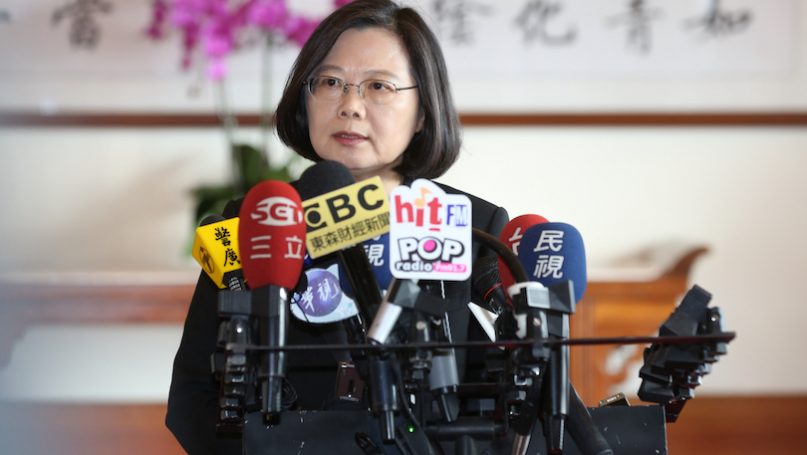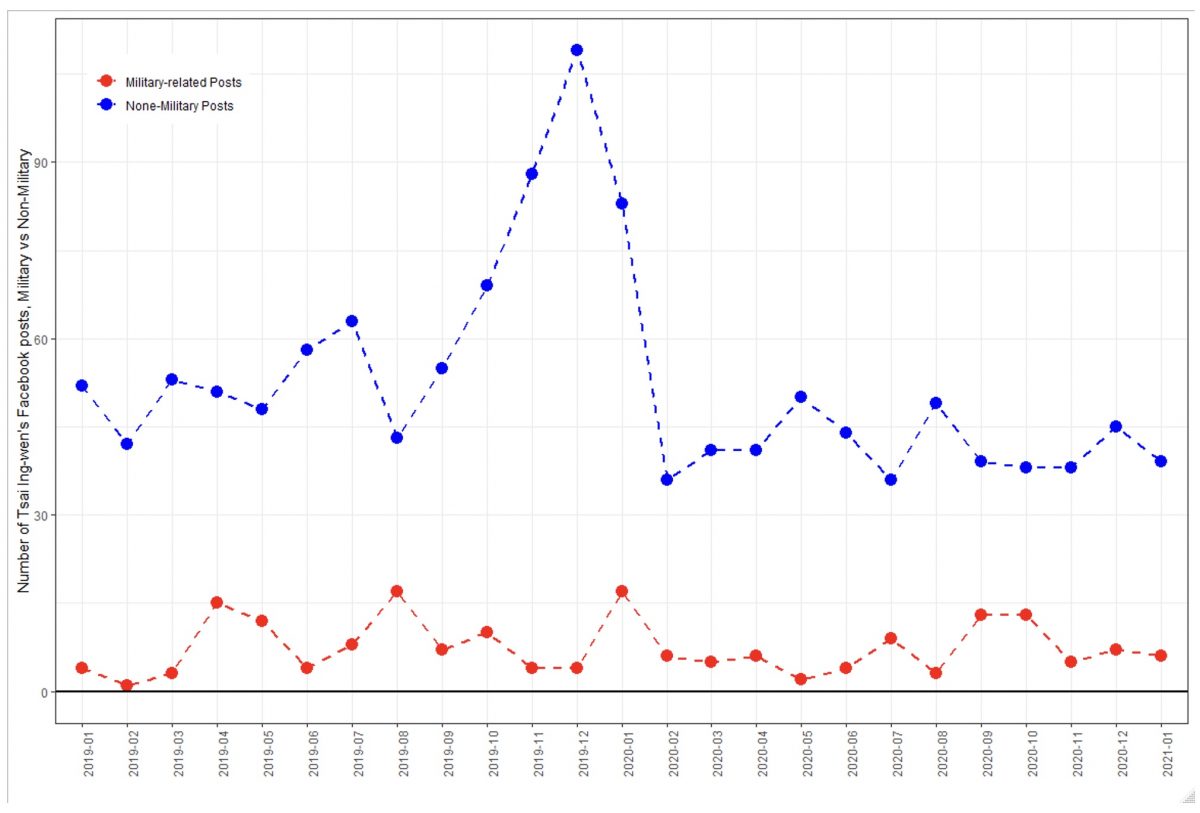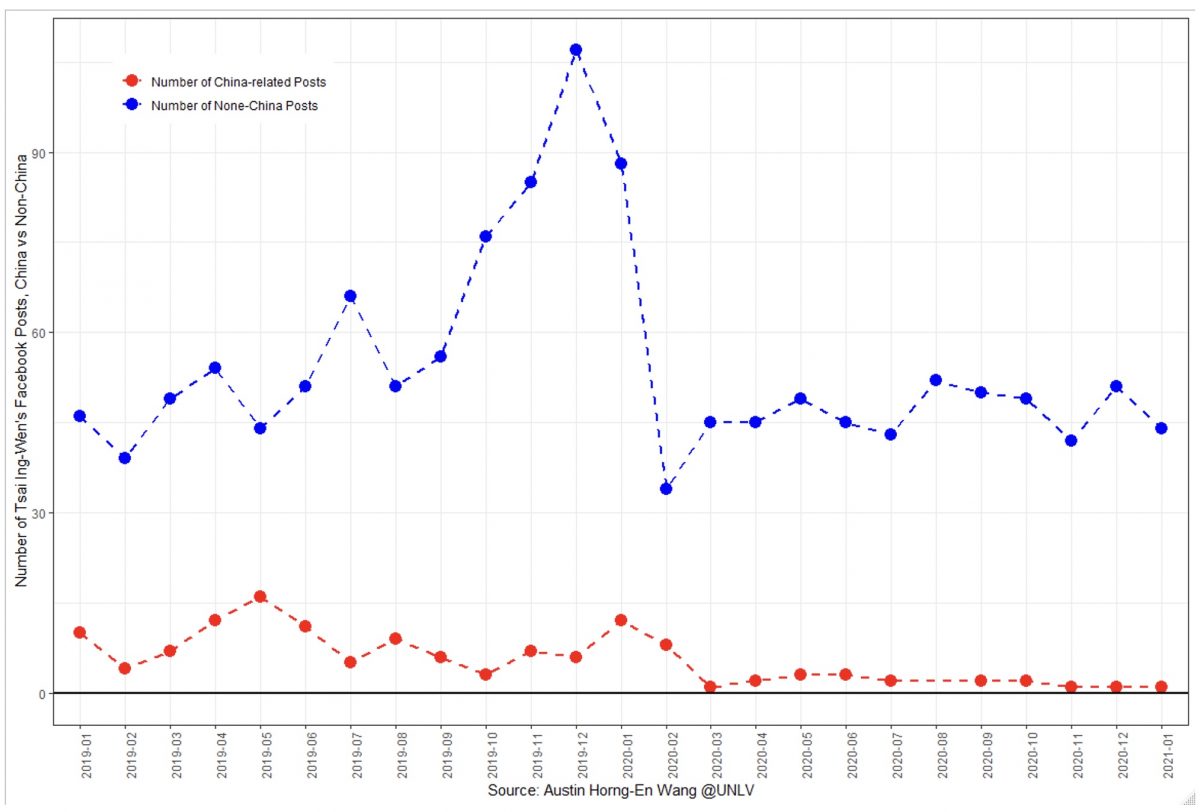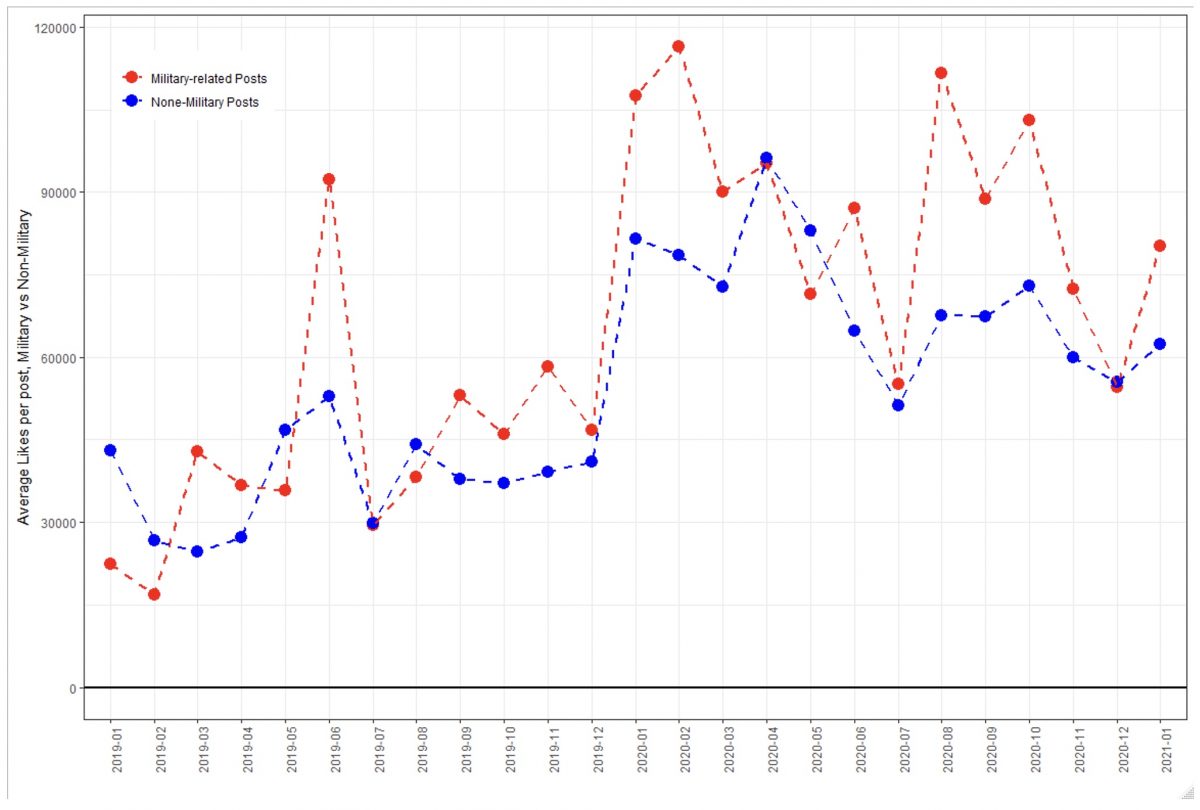
In international relations, leaders often resort to diversionary military action to dodge domestic criticisms and boost approval. For leaders of weak states, such an approach could be counter-productive. Careless diversionary wars could very likely produce the exact opposite result, incurring the wrath of another country, threatening the weak state’s security, and ultimately losing electoral support at home. The choice of strategies is critical in the US-China-Taiwan relationship. With China’s rapid enhancement in its military capacities, Taiwan also needs to keep upgrading its military capacity to maintain the uneasy status quo. As a democratic regime, leaders of Taiwan need public approval to increase military spending. Taiwanese leaders could identify China as the main enemy to win support, but such a diversionary framing may further infuriate China and then backfire at home. Hence, we investigate how the incumbent President of Taiwan, Tsai Ing-wen, manages this dilemma by examining how she communicates national security issues to the public and whether her foreign policy rhetoric shifts in response to the presidential elections in both Taiwan (January) and the US (November) in 2020.
To summarize, we provide evidence showing that (1) President Tsai steadily emphasizes the importance of national defense since 2019, and the strength did not change because of the presidential elections in both Taiwan and the US; (2) Tsai often mentioned cross-Strait relations before Taiwan’s Presidential Election in January 2020, but barely did so after the reelection; and (3) Taiwanese public has responded to Tsai’s rhetoric more favorably after she dropped China from her national security posts since the reelection.
We analyzed all of Tsai’s Facebook posts from Jan. 2019 – Jan 2021, resulting in 1495 posts, averaging about 2 posts per day. We focus on Facebook because, according to a 2019 telephone survey with Internet users by Taiwan Network Information Center, 99% of Taiwanese people use Facebook. President Tsai’s page has more than 3 million followers, 1/7 of the Taiwanese population. She has been actively utilizing Facebook as the primary tool to communicating with citizens, sometimes through live casting talks from the presidential office. Therefore, we contend that one can infer her framing and rhetoric toward specific issues from her Facebook posts.
We select the time frame from the beginning of 2019 to January 2021. The year 2019 began with China’s Secretary-General Xi Jinping’s tough speech on unification and threats of use of force against Taiwan. On the other hand, as of the end of January 2021, we can observe Tsai’s tones after the US presidential election last November.
Among all 1495 Tsai’s Facebook posts, 185 posts (about 1.8 posts per week) revolve around defense topics (e.g., national security, the military, submarines, missiles, conscription, soldiers), accounting for 12% of total posts. Considering the temporal dimension, the frequency with which Tsai referred to national security (hereinafter “NS”) issues are stable, hitting about 7.7 posts per month unless major events such as festivals, natural tragedies, and domestic rescue missions are taking place. Additionally, Tsai posted at least 6 NS related posts for three consecutive months after the U.S. general election in November 2020, busting myths that her administration overlooked national security to prepare for potential changes in US-Taiwan relations. However, a closer look at the figure below shows that the frequency comports with the average.
In figure 1, a red pot denotes the number of NS posts; a blue dot indicates the number of all the other topics. We could observe a spike of non-NS posts starting three months before the 2020 general election in Taiwan. Aside from those spikes, the frequency for NS and non-NS topics overall are stable.
Meanwhile, the framing of NS issues also underwent major changes in the period, especially when it is related to China. In figure 2, the red dots refer to NS topics about China; blue dots cover all the other NS topics. The election seems to be a threshold: between 2019 and early 2020, Tsai mentioned China on an average of 8.5 times/month; after February 2020, the frequency dropped to 1.5 times.
In other words, since the emergence of COVID-19 and Tsai won the reelection in January 2020, the major theme for NS posts turned to focus more on the importance of self-defense rather than directly belaboring China. Such a decision may be strategic and recommended by the national security apparatus to avoid confrontation. That being said, it seems that this change had little to do with President Trump or any potential changes in US-Taiwan relations.
We also found that the public reciprocates Tsai’s commitment to NS issues. Figure 3 shows the average of “likes” on Tsai’s Facebook per month for NS and non-NS issues. The takeaway – average likes for NS are higher than most non-NS issues, reflecting public enthusiasm for NS issues. It also means that Tsai has successfully taken the ownership of NS issues from KMT. However, it is unclear if Tsai or her party could continue to hold on to the ownership; factors such as her successors, party support, and expertise on these issues are factors that influence it.
We noticed that the average likes for NS and non-NS topics both went up after winning her re-election in Jan. 2020. Perhaps this was due to a new honeymoon period from her election or the rallying effect from fighting the pandemic. Noticeably, Tsai’s NS posts received a lot more likes compared to non-NS posts after January 2020. Tsai’s NS posts received 50% more likes than non-NS posts in eight of the twelve months after she won the reelection, which coincides with her change of rhetoric we discussed in the previous two sections.
Hence, we interpret this shift as positive feedback from the Taiwanese public on Tsai’s national security strategy choice. Taiwanese people know the importance of national security and are willing to see the President emphasize it (so NS posts receive more likes than the others). At the same time, they do not want the President to confront China too early or blatantly for unwanted consequences. Hence, Tsai’s change of rhetoric after the 2020 re-election is welcomed by the Taiwanese public. Such a change of strategy not only stabilizes the US-China-Taiwan dynamics but also receives support from the public.
The trend also dovetails with the results from recent surveys in Taiwan. For example, the 2020 National Security Survey conducted by Duke University shows that Taiwanese people increased their level of awareness on national security and were more willing to defend Taiwan, compared with the results in the previous surveys since 2002. Meanwhile, note that the average likes seem to come down from the apex in January 2020 in both categories. This decrease is sensible as Tsai’s personal effects of winning the re-election gradually wore off. As the pandemic continues to spread, citizens would naturally start paying attention to other topics.
There are a couple of caveats. Here, we did not analyze changes in approval for Tsai during this period, barring us from concluding that such tactics succeed in increasing support for Tsai. Another one is that those who give “likes” to her posts with Tsai are likely to be supportive of her already (i.e., the problem of self-selection). Nevertheless, it is undeniable that the number of likes to her NS posts was regularly higher than non-NS posts, amid her success in managing the spread of the pandemic in Taiwan.
On the other hand, it is unclear if Tsai is posting NS topics to consolidate support within her base or the general public. Tsai’s approval was already high before the election, so her tactics of posting NS topics might strengthen certain images of her inside her supporters. Tsai did mention more of China before the election, supporting the logic that an external enemy does help leaders gain more attention and support at home. Predictably, when the election was over with Tsai’s victory, references to China were greatly reduced.
This short analysis shows that weak state leaders could use different means to win or consolidate public support. Tsai is persistent in raising attention and awareness of national security issues through her Facebook account, but she is also aware that over-emphasizing China could be dangerous. The alternation in her national security rhetorics is evident to this logic. Meanwhile, we also observe increasing support/likes for national security issues. This indicates a higher awareness of self-defense issues among the Taiwanese public. Diversionary tactics are certainly employed in this case, and Tsai managed them in a self-cautious way.
Figure 1

Figure 2

Figure 3

Further Reading on E-International Relations
- Opinion – Why Tsai Ing-wen’s Victory is a Blessing for the Taiwan Strait
- Opinion – Taiwan Could Be to China What Canada Is to the US
- Opinion – Beijing’s Weaponisation of Diplomacy Against Taiwan
- Opinion – Taiwan’s Almighty Squeeze
- Opinion – Omens for US-Taiwan Relations in the Biden Administration
- Opinion – Understanding Taiwan’s 2024 Presidential Election